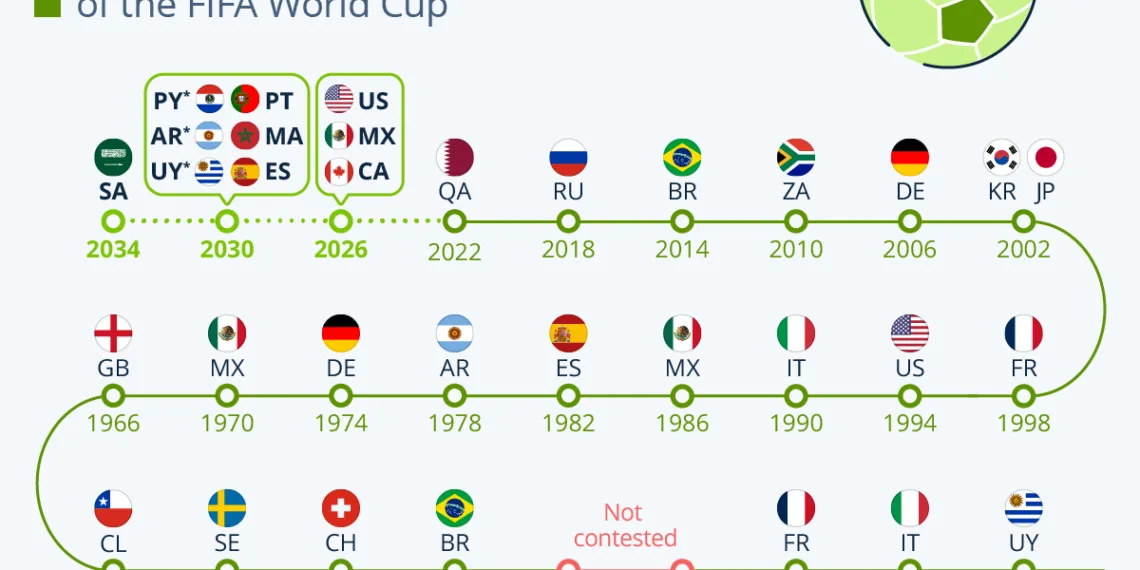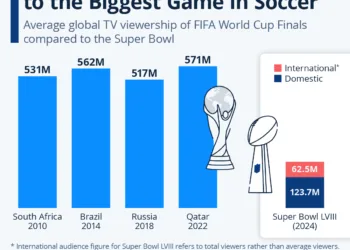Select Language:
The Growing Global Footprint of the FIFA World Cup
Introduction to the 2030 World Cup
In a historic announcement, FIFA confirmed that Spain, Portugal, and Morocco will jointly host the 2030 World Cup. This decision is particularly significant as it marks the centenary celebration of the first World Cup that took place in Uruguay in 1930. To honor this milestone, there will also be a ceremonial event in Montevideo, the capital of Uruguay, along with three inaugural matches being held in Uruguay, Argentina, and Paraguay.
An Unprecedented Format
The 2030 World Cup will introduce a groundbreaking format, making it the first tournament to take place across six different nations and three continents: Africa, Europe, and South America. Historically, the World Cup has never been staged in more than two countries or across multiple continents at once.
To illustrate this, we can look back at previous tournaments, such as the 2002 edition, which was jointly hosted by South Korea and Japan. The upcoming World Cup in 2026, to be held in the United States, Mexico, and Canada, will further expand the concept of cross-border hosting.
Environmental Concerns
With this ambitious plan comes a wave of criticism, particularly regarding the environmental impact on the planet. FIFA’s president, Gianni Infantino, remarked on the potential for unity in a "divided world," but environmentalists are voicing serious concerns about the carbon footprint that such a geographically widespread tournament could create.
Traveling fans, players, and officials across three continents will undoubtedly lead to increased air travel, which is a major contributor to carbon emissions. The logistics of managing such a massive event across diverse locations will require careful planning, but the environmental costs are already being scrutinized.
Meteorological Challenges
Another logistical issue arises from the geographical spread of the tournament. The 2030 World Cup spans several hemispheres, presenting unique challenges related to seasonal weather variations. Teams may find themselves competing under drastically different weather conditions, which can have a significant impact on performance. This situation raises questions about fairness and the preparedness of teams accustomed to specific climatic conditions.
Historical Context of the World Cup
Since its inception, the FIFA Men’s World Cup has occurred every four years, with only two exceptions during the Second World War in 1942 and 1946. The rich history of the tournament has seen it evolve, not just in terms of participating countries but also politically and socially.
As the 2034 World Cup is already set to be hosted by Saudi Arabia, which attracted its share of international scrutiny, the ongoing evolution of the World Cup reflects broader changes within global football and international relations.
Implications for Future Tournaments
The format and planning of the 2030 World Cup may set a precedent for future tournaments, prompting FIFA to consider bolder, more inclusive hosting strategies. However, the road ahead is fraught with challenges as FIFA will need to address growing concerns around environmental sustainability, weather unpredictability, and the fair treatment of competing teams.
Conclusion
This monumental decision regarding the 2030 World Cup not only highlights the expanding global footprint of football but also emphasizes the need for responsible planning and execution in the face of pressing environmental concerns. As the anticipation builds towards this landmark event, it is essential for FIFA to balance ambition with accountability, ensuring that the beautiful game remains sustainable and equitable for all involved.





